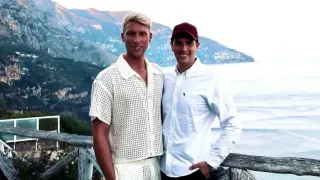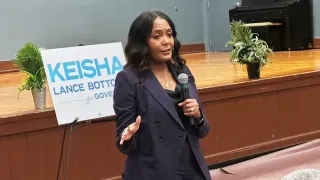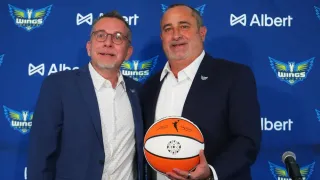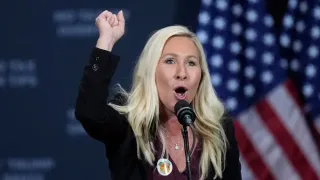
2 hours ago
From Silence to Slam Dunks: Isaac Humphries Turns Pain into Power as NBL’s Out Gay Trailblazer
READ TIME: 16 MIN.
On a day that now feels stitched into the fabric of queer sports history, Isaac Humphries—then a towering force for Melbourne United—stood before his teammates and delivered more than a game plan. He delivered a truth. “I decided that if I'm going to join a team, I'm going to come out publicly and just. .. make sure people know, sorry, that you can live and you don't have to hide, ” he later recalled, voice cracking with emotion as the memory lingered in the air like the echo of a buzzer-beater. With that declaration, Humphries became the first openly gay male athlete in Australia’s top basketball league, and only the second in a global men’s pro league since Jason Collins’ historic NBA announcement in 2013.
What followed was not the end of his journey, but the beginning of a new game—one that demanded more than athletic prowess. It required vulnerability, resilience, and a willingness to turn heartbreak into hope for others watching from the stands or from the shadows.
Humphries’ journey to self-acceptance was anything but a straight line. For years, he played defense—not just on the court, but against his own truth. “I was very much struggling with my sexuality and coming to terms with the fact that I'm gay, ” he shared, a candor that resonates with anyone who’s ever feared the costs of authenticity. That struggle nearly ended in tragedy. Humphries has spoken openly about how the burden of secrecy led him to a dark place: “I did have a suicide attempt and that is a full part of me coming to terms with my sexuality. ” It was only when he was ready to confide in his mother—a conversation years in the making—that the tide began to turn.
Visibility, he now insists, is not just a personal milestone; it’s a public good. “It hasn’t felt like sport was a place for us, particularly male sport, ” Humphries told the Adelaide 36ers, reflecting on the historic weight of his announcement. “My presence in basketball now globally is helping that stigma, that stereotype that you can’t be gay and play a sport. ” His story isn’t just about crossing lines; it’s about erasing them.
Coming out didn’t just change Humphries’ life—it transformed the league. As the NBL celebrates its annual Pride Round, Humphries stands as both participant and symbol. “From a player's point of view, having a Pride Round and knowing that the league is supporting me and my community. .. it is a space for everybody. ” The impact is palpable, with Humphries and Adelaide United’s Josh Cavallo now the only openly gay male athletes in Australia’s major sports leagues.
But Humphries’ activism doesn’t end at the rainbow archway of the arena. He has become an outspoken advocate for mental health, suicide prevention, and LGBTQ+ visibility—a trifecta of urgency in a world still grappling with acceptance. “If I had just made my announcement and got this big acceptance from this whole global community and then stayed quiet. .. I wouldn’t feel like it was for anything, ” he said, underscoring his commitment to staying visible and vocal.
He’s been candid about the rewards of coming out: “I can be myself in my life, which is great. ” But the deeper reward, he insists, is giving back to the community that “lifted me up when I was down, lifted me up when I made my announcement. ” For Humphries, pride is as much about collective joy as it is about personal triumph: “Proud to be part of a community that is about happiness and joy and acceptance and positive things for once. ”
In a sports culture that too often equates masculinity with silence, Humphries’ story is a raucous, rainbow-hued rejection of shame. His journey speaks directly to anyone who’s ever felt they had to choose between their passion and their identity. “It almost feels like these gates opened up and so many opportunities came from a three-minute video, ” he said, describing the viral moment his announcement hit the world. But those three minutes were built on years of quiet courage—a reminder that queer liberation is both spectacular and slow.
Today, Humphries is more than just a basketball star; he’s a beacon. He’s teamed up with organizations like R U OK? to amplify conversations around mental health, knowing firsthand how one check-in can tip the scales from despair to possibility. “Sometimes you just need your mum to tell you everything’s going to be all right, ” he said with a smile, a gentle nudge to anyone still searching for their safe space.
For the LGBTQ+ community, especially those who grew up believing the locker room was enemy territory, Humphries’ story is a fast break into the future—a world where queer athletes don’t have to hide, where coming out is less a headline and more a rite of passage, and where hope is as much a part of the game as a perfectly executed pick-and-roll.
As the NBL’s Pride Round returns, so does the reminder: It’s not just about visibility for one player. It’s about a whole league—and a whole world—making room for joy, authenticity, and the unapologetic audacity to live out loud.
If you or someone you know needs support, resources like Lifeline are available 24/7. Because, as Isaac Humphries proves, even the darkest days can lead to the brightest courts.






